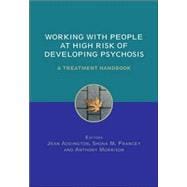
Note: Supplemental materials are not guaranteed with Rental or Used book purchases.
Purchase Benefits
What is included with this book?
Shona M. Francey is a clinical psychologist with 20 years’ experience in public mental health. She began working in the field of early intervention for psychosis when the Early Psychosis Prevention and Intervention Centre (EPPIC) was first established in 1992 in Melbourne, Australia.Within the EPPIC programme she worked as a case manager, COPE therapist and Group Programme leader. COPE is a cognitively oriented psychotherapy that was developed at EPPIC to promote recovery from first episode psychosis. Shona has also been involved in education and training about early psychosis, and the establishment of the PACE Clinic for young people thought to be at risk of developing psychosis. At PACE she has contributed to the development and evaluation of psychological therapy for this at risk group. She completed her PhD examining neurocognitive indicators of risk for psychosis in the PACE population and is currently the Clinical Coordinator of the PACE Clinic.
Anthony P. Morrison is a Reader in Clinical Psychology at the University of Manchester and is also a Consultant Clinical Psychologist in a specialist programme of care for people with early psychosis in Salford and Trafford. He has published a number of articles on trauma and psychosis, cognitive therapy for psychosis and experimental studies of cognitive processes in psychosis, and has been involved in a number of treatment trials for cognitive therapy for early psychosis and the prevention of psychosis. He has also published several books on the topic of psychological approaches to the understanding and treatment of psychosis. Unkind observers have suggested his interest in both trauma and losing touch with reality stem from his support of Manchester City Football Club.
| About the Editors | p. ix |
| List of Contributors | p. x |
| Foreword | p. xii |
| Acknowledgements | p. xiii |
| Introduction | p. 1 |
| Identification of the Population | p. 7 |
| Assessment and Developing a Formulation | p. 25 |
| Engagement and the Therapeutic Alliance | p. 41 |
| Assessing and Managing Stress | p. 53 |
| Treatment Targets in the Pre-psychotic Phase | p. 75 |
| Substance Use and the 'At Risk' Period | p. 93 |
| Addressing Attenuated Symptoms in 'At Risk' Clients | p. 111 |
| Brief Limited Intermittent Psychotic Symptoms (BLIPS): A Cognitive Behavioural Approach to Formulation and Intervention | p. 129 |
| Working with Families Following the Diagnosis of an At Risk Mental State | p. 153 |
| Group Therapy for People at High Risk of Developing Psychosis | p. 169 |
| Future Challenges | p. 181 |
| Index | p. 187 |
| Table of Contents provided by Ingram. All Rights Reserved. |
The New copy of this book will include any supplemental materials advertised. Please check the title of the book to determine if it should include any access cards, study guides, lab manuals, CDs, etc.
The Used, Rental and eBook copies of this book are not guaranteed to include any supplemental materials. Typically, only the book itself is included. This is true even if the title states it includes any access cards, study guides, lab manuals, CDs, etc.